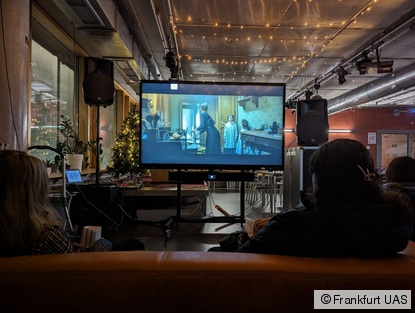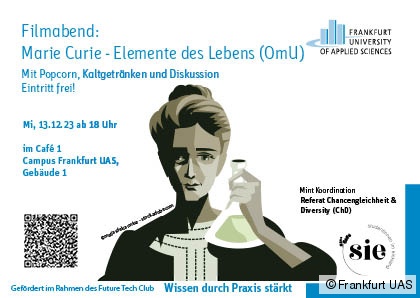The film screening of „Radioactive“ attracted many students
As part of our film series "Future of Technology," the Department for Equal Opportunities and Diversity once again invited attendees to a film screening on December 13, 2023. In the well-attended Café 1, we watched the feature film "Radioactive" on the campus of Frankfurt UAS.
The Polish physicist and chemist Marie Curie was a brilliant scientist. She discovered the chemical elements radium and polonium and coined the term "radioactive." For her groundbreaking discoveries, she received the Nobel Prize twice. Throughout her life, she faced discrimination due to her gender. In Poland, women were not allowed to study, which is why Curie had to move to Paris. She became the first female professor at the Sorbonne in Paris and had to deal with a hostile public and press that attacked her both because of her gender and her Jewish heritage.
The film entertainingly and excitingly staged Curie's turbulent life. From the refusal of the Sorbonne's university board to provide Curie with her own laboratory space, to her relationship with Pierre Curie, who played a significant role in her life until his death, to the anti-Semitic and sexist campaigns Curie endured after her husband's death, the film depicted an extraordinary personality who overturned scientific convictions and enabled completely new technological developments. With dramatic shifts in time, the film addressed the far-reaching consequences of Curie's discoveries, including the depiction of the atomic bomb drop over Hiroshima, the Chernobyl reactor disaster, and the use of the first radiation therapies for cancer treatment.
Following the film, we engaged in a lively discussion with attendees about questions of ethics and responsibility in science. Should research be limited? Should there be stronger democratic controls over new developments? How much responsibility do scientists bear for the use of their research? These questions sparked a vibrant debate. However, everyone agreed that such questions and discussions must absolutely take place both in the education and in the practice of scientific research and development.


